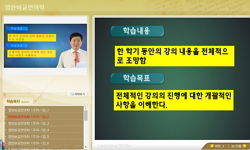1763년 7월 24일, 英祖의 부름에 입시하여 작시능력을 시험받고 칭찬까지 받았던 秋月 南玉(1722~1770)은 1763~4년 계미-갑술 통신사 사행시 제술관으로서 임무를 수행하는 동안 줄곧 일본문사들의...
http://chineseinput.net/에서 pinyin(병음)방식으로 중국어를 변환할 수 있습니다.
변환된 중국어를 복사하여 사용하시면 됩니다.
- 中文 을 입력하시려면 zhongwen을 입력하시고 space를누르시면됩니다.
- 北京 을 입력하시려면 beijing을 입력하시고 space를 누르시면 됩니다.

동아시아 문화교류와 통신사 필담창화집 ; 『문차여향(問차餘響)』과 『일관창수(日觀唱酬)』 소재(所載) 남옥(南玉)의 수응시(酬應詩) 비교(比較) 연구(硏究) = Cultural Exchanges in East Asia and Collections of Exchanged Correspondences and Poetry of Chosun Missions to Japan ; A Comparative Study on Nam-Ok`s Reply Poems Recorded in Munsayeohyang (問차餘響) and Ilgwanchangsu (日觀唱酬)
한글로보기https://www.riss.kr/link?id=A82568424
- 저자
- 발행기관
- 학술지명
- 권호사항
-
발행연도
2011
-
작성언어
-
-
주제어
추월남옥 ; 『문사여향』 ; 『일관창수』 ; 수응시 ; 시제 ; 詩題 ; 시어 ; 詩語 ; 비교 ; Chuwol Nam-ok ; 秋月南玉 ; Munsayeohyang ; 문차여향 ; Ilgwanchangsu ; 日觀唱酬 ; Reply Poem ; a Comparison of Poem Titles and Poetic Language
-
KDC
900
-
등재정보
KCI등재
-
자료형태
학술저널
-
수록면
109-165(57쪽)
- 제공처
- 소장기관
-
0
상세조회 -
0
다운로드
부가정보
국문 초록 (Abstract)
1763년 7월 24일, 英祖의 부름에 입시하여 작시능력을 시험받고 칭찬까지 받았던 秋月 南玉(1722~1770)은 1763~4년 계미-갑술 통신사 사행시 제술관으로서 임무를 수행하는 동안 줄곧 일본문사들의 시에 화답한 자신의 수응시에 대해 부끄러워하고 급기야 수응제도 자체를 폐지하자고까지 주장한다. 본고에서는 그 직접적인 원인이 무엇인지 살펴보고자 한다. 먼저 『문사여향』에 대한 서지 사항과, 서문을 쓴 那波師曾 및 추월과 시를 주고받은 주요 일본문사들(石川貞·田立松·伊藤一元·星野貞之 등)에 대해 살펴본 뒤, 이어 『문사여향』과 『일관창수』에 수록된 추월의 수응시를 비교 검토해 보았다. 그 결과, 아래와 같은 몇 가지 사실들을 확인할 수 있다. 추월은 일본에서 일본문사들에게 수응했던 시 곧 『문사여향』에 수록된 시를, 귀국하여 여유를 갖고 『일관창수』로 묶으면서 손질을 하게 된다. 제목의 경우는 통일을 기하면서 동시에 자호와 성씨에 대한 過禮와 非禮的인 표현 등을 손질하였고, 시 내용의 경우는 추월 나름대로의 시적 성취도에 준하여 수정여부를 결정하였다. 문제가 없다고 생각되는 절반 정도는 전혀 수정을 하지 않은 채 『일관창수』에 그대로 수록하였고, 표현이 군색하거나 평측이 부자연스러운 부분은 물론 내용이 실상을 제대로 반영하지 못한 시구 등은 모두 꼼꼼하게 수정하였다. 이런 수정 사실을 통해 우리는 추월의 수응시에 대한 부끄러움이 구체적으로 무엇이었는지 알 수 있다.
다국어 초록 (Multilingual Abstract)
Chuwol Nam-Ok (秋月南玉, 1722~1770), who had answered King Yeongjo`s call to government service by taking the government examination on July 24, 1763, had his versification skills tested and even received praise for his talents. From 1763 to 1764,...
Chuwol Nam-Ok (秋月南玉, 1722~1770), who had answered King Yeongjo`s call to government service by taking the government examination on July 24, 1763, had his versification skills tested and even received praise for his talents. From 1763 to 1764, when he served as a Jesulgwan, or a government scholar who dealt with foreign affairs, during the Gyemi diplomatic mission, he mainly worked on responding in kind to the poems given by Japanese literary scholars. However, he was embarrassed by the poems he wrote as replies and, in the end, even argued that they should discontinue such a system of responding to poems with poems. This paper aims to examine the causes that directly contributed to this development. The paper first examines the particulars of the introduction to Munsayeohyang (問차餘響) and Napasajeung (那波師曾), who wrote the preface, as well as other major Japanese scholars who had exchanged poems with Chuwol, including Seokcheonjeong (石川貞), Jeollipsong (田立松), Ideungilwon (伊藤一元), and Seongyajeongji (星野貞之). Chuwol`s reply poems contained in Munsayeohyang (問차餘響) and Ilgwanchangsu (日觀唱酬) were carefully compared. The results are as follows. Chuwol`s poems written as replies to the Japanese scholars while he was in Japan were quickly collected into Munsayeohyang (問차餘響), but once he returned to Korea and had more time, he made revisions to the poem and collected the poems again into Ilgwanchangsu (日觀唱酬). In the case of titles, aiming at unification, he revised expressions that were too polite or impolite regarding one`s title or family name, and in the case of poem content, Chuwol also prepared his own assessment of poetic accomplishment and decided whether to apply revisions or not. About half of what he wrote was collected into Ilgwanchangsu (日觀唱酬) without any revisions, but the other portions that he felt were of poor quality or were poetically awkward, or those that did not appropriately reflect reality were all meticulously revised. By examining the revisions that were made, we discover in detail what Chuwol was embarrassed about regarding his reply poems.
동일학술지(권/호) 다른 논문
-
동아시아 문화교류와 통신사 필담창화집 ; 1763년 필담자료를 통해 본 에도에서의 문사 교류 -『경개집(傾蓋集)』 서문에 보이는 인식을 중심으로-
- 연세대학교 국학연구원
- 구지현 ( Jea Hyoun Koo )
- 2011
- KCI등재
-
동아시아 문화교류와 통신사 필담창화집 ; 후쿠오카번(福岡藩)과 통신사(通信使)
- 연세대학교 국학연구원
- 다카하시마사히코 ( Takahashi Masahiko )
- 2011
- KCI등재
-
동아시아 문화교류와 통신사 필담창화집 ; 임술(壬戌) 1682년 사행(使行)과 후지산시(富士山詩) -소신(祖辰)을 중심으로-
- 연세대학교 국학연구원
- 미노와요시쯔구 ( Minowa Yoshitsugu )
- 2011
- KCI등재
-
서주(西周)왕조의 족(族)의 재배치와 동성부혼(同姓不婚) -동정(東征) 이후 서주왕조(西周王朝)의 족(族) 통일정책에 대한 검토-
- 연세대학교 국학연구원
- 민후기 ( Hoo Ki Min )
- 2011
- KCI등재




 KCI
KCI 스콜라
스콜라







